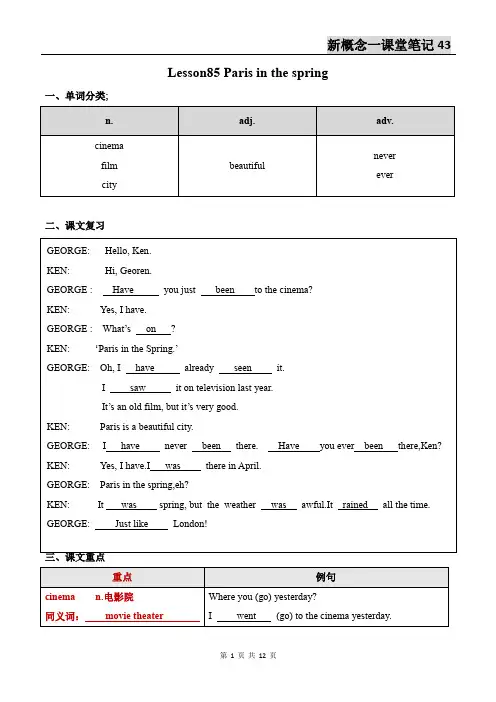新概念英语第一册Lesson85-86经典
- 格式:ppt
- 大小:4.62 MB
- 文档页数:43
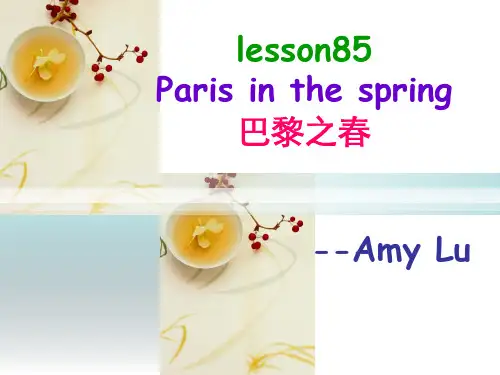
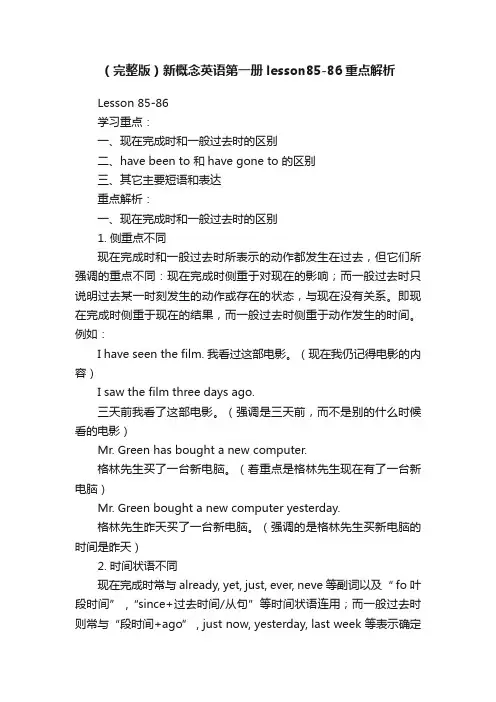
(完整版)新概念英语第一册lesson85-86重点解析Lesson 85-86学习重点:一、现在完成时和一般过去时的区别二、have been to 和have gone to 的区别三、其它主要短语和表达重点解析:一、现在完成时和一般过去时的区别1. 侧重点不同现在完成时和一般过去时所表示的动作都发生在过去,但它们所强调的重点不同:现在完成时侧重于对现在的影响;而一般过去时只说明过去某一时刻发生的动作或存在的状态,与现在没有关系。
即现在完成时侧重于现在的结果,而一般过去时侧重于动作发生的时间。
例如:I have seen the film. 我看过这部电影。
(现在我仍记得电影的内容)I saw the film three days ago.三天前我看了这部电影。
(强调是三天前,而不是别的什么时候看的电影)Mr. Green has bought a new computer.格林先生买了一台新电脑。
(着重点是格林先生现在有了一台新电脑)Mr. Green bought a new computer yesterday.格林先生昨天买了一台新电脑。
(强调的是格林先生买新电脑的时间是昨天)2. 时间状语不同现在完成时常与already, yet, just, ever, neve等副词以及“ fo叶段时间” ,“since+过去时间/从句”等时间状语连用;而一般过去时则常与“段时间+ago” , just now, yesterday, last w eek 等表示确定的过去时间的状语连用。
例如:She has lived here since two years ago.她两年前就住在这里了。
(暗含她可能还会在这里住下去)She lived here two years ago.两年前她住在这里。
(暗含她曾经住过,但现在不在这里了)He has been in the company for three years.他在这家公司已经三年了。
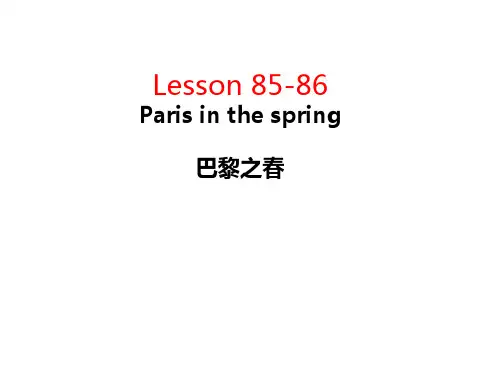
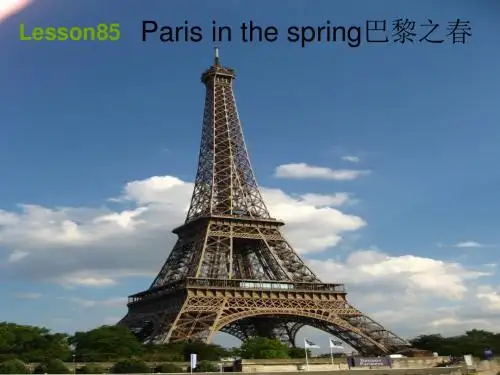
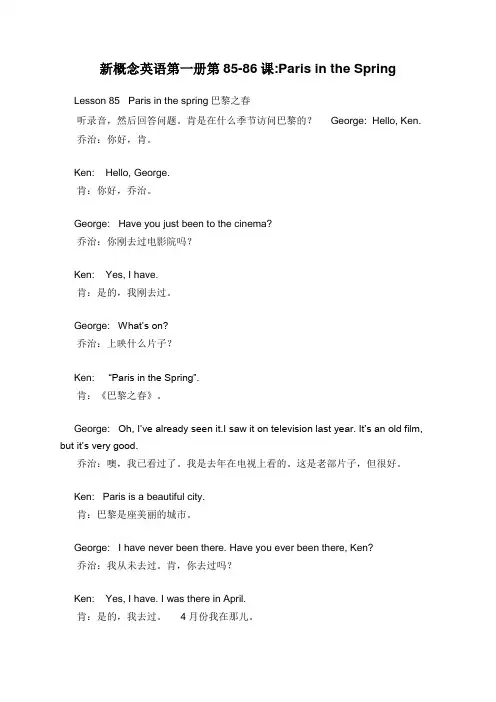
新概念英语第一册第85-86课:Paris in the SpringLesson 85 Paris in the spring巴黎之春听录音,然后回答问题。
肯是在什么季节访问巴黎的? George: Hello, Ken.乔治:你好,肯。
Ken: Hello, George.肯:你好,乔治。
George: Have you just been to the cinema?乔治:你刚去过电影院吗?Ken: Yes, I have.肯:是的,我刚去过。
George: What’s on?乔治:上映什么片子?Ken: “Paris in the Spring”.肯:《巴黎之春》。
George: Oh, I’ve already seen it.I saw it on television last year. It’s an old film, but it’s very good.乔治:噢,我已看过了。
我是去年在电视上看的。
这是老部片子,但很好。
Ken: Paris is a beautiful city.肯:巴黎是座美丽的城市。
George: I have never been there. Have you ever been there, Ken?乔治:我从未去过。
肯,你去过吗?Ken: Yes, I have. I was there in April.肯:是的,我去过。
4月份我在那儿。
George: Paris in the spring, eh?乔治:那是巴黎之春,是吗?Ken: It was spring, but the weather was awful. It rained all the time.肯:是春天,但天气太糟了。
一直在下雨。
George: Just like London!乔治:就像伦敦一样!New words and Expressions 生词和短语Parisn. 巴黎cineman. 电影院filmn. 电影beautifuladj. 漂亮的cityn. 城市neveradv. 从来没有everadv. 在任何时候Notes on the text 课文注释1 have been to... 到过...。
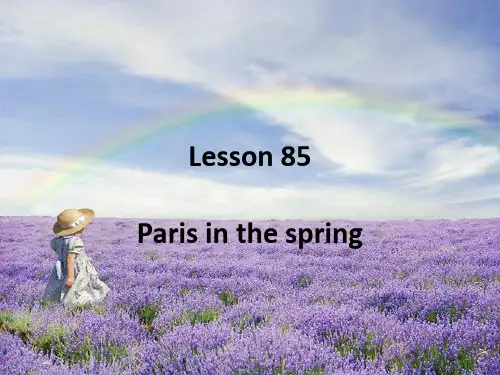
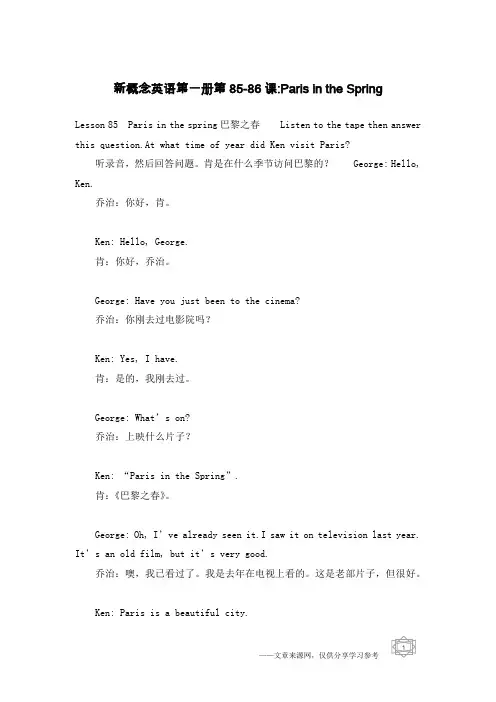
新概念英语第一册第85-86课:Paris in the SpringLesson 85 Paris in the spring巴黎之春Listen to the tape then answer this question.At what time of year did Ken visit Paris?听录音,然后回答问题。
肯是在什么季节访问巴黎的?George: Hello, Ken.乔治:你好,肯。
Ken: Hello, George.肯:你好,乔治。
George: Have you just been to the cinema?乔治:你刚去过电影院吗?Ken: Yes, I have.肯:是的,我刚去过。
George: What’s on?乔治:上映什么片子?Ken: “Paris in the Spring”.肯:《巴黎之春》。
George: Oh, I’ve already seen it.I saw it on television last year. It’s an old film, but it’s very good.乔治:噢,我已看过了。
我是去年在电视上看的。
这是老部片子,但很好。
Ken: Paris is a beautiful city.肯:巴黎是座美丽的城市。
George: I have never been there. Have you ever been there, Ken? 乔治:我从未去过。
肯,你去过吗?Ken: Yes, I have. I was there in April.肯:是的,我去过。
4月份我在那儿。
George: Paris in the spring, eh?乔治:那是巴黎之春,是吗?Ken: It was spring, but the weather was awful. It rained all the time. 肯:是春天,但天气太糟了。
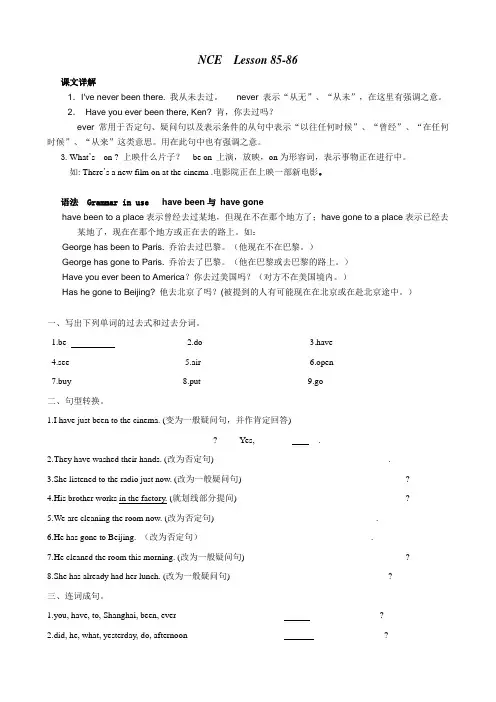
NCE Lesson 85-86课文详解1.I've never been there. 我从未去过。
never 表示“从无”、“从未”,在这里有强调之意。
2.Have you ever been there, Ken? 肯,你去过吗?ever常用于否定句、疑问句以及表示条件的从句中表示“以往任何时候”、“曾经”、“在任何时候”、“从来”这类意思。
用在此句中也有强调之意。
3.What’s on ? 上映什么片子?be on 上演,放映,on为形容词,表示事物正在进行中。
如: There’s a new film on at the cinema .电影院正在上映一部新电影。
语法 Grammar in use have been与have gonehave been to a place表示曾经去过某地,但现在不在那个地方了;have gone to a place表示已经去某地了,现在在那个地方或正在去的路上。
如:George has been to Paris. 乔治去过巴黎。
(他现在不在巴黎。
)George has gone to Paris. 乔治去了巴黎。
(他在巴黎或去巴黎的路上。
)Have you ever been to America?你去过美国吗?(对方不在美国境内。
)Has he gone to Beijing? 他去北京了吗?(被提到的人有可能现在在北京或在赴北京途中。
)一、写出下列单词的过去式和过去分词。
1.be __________2.do ___________ __________3.have ___________ __________4.see ___________ __________5.air ___________ __________6.open ___________ __________7.buy __________ __________ 8.put __________ __________ 9.go ________ ___________二、句型转换。

